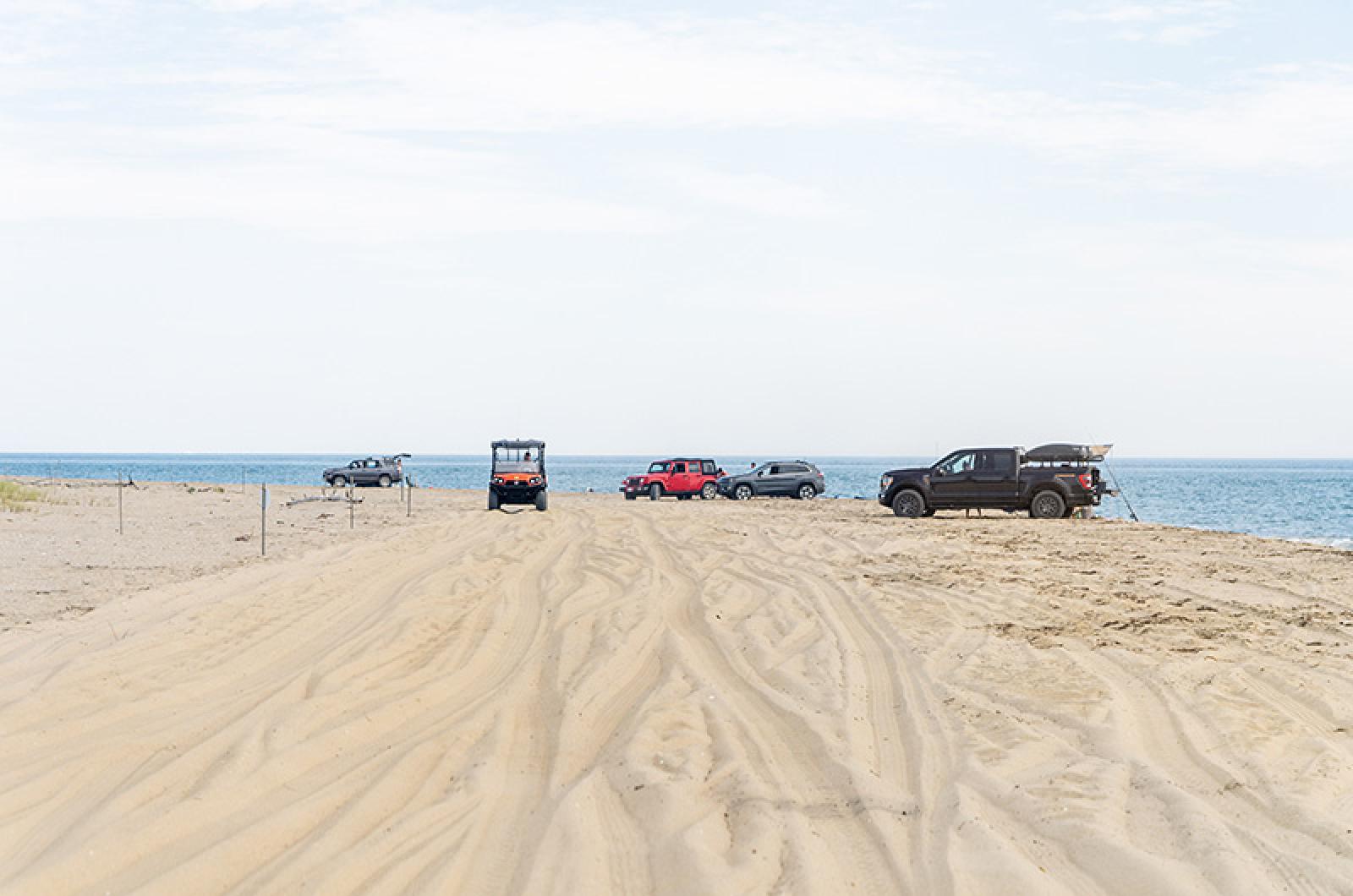After five months of contentious debate, Chappaquiddick beaches will be open to oversand vehicle (OSV) access once more.
In a heavily attended public hearing on Wednesday, the Edgartown conservation commission conditionally approved The Trustees of Reservations application to sell OSV permits on Trustees property from Wasque to the Jetties, allowing people to drive out to beaches again this summer and through the derby.
The commission has yet to finalize its order of conditions, but the agreement will only extend until the end of November, when the Trustees will have to submit a new application with a revised beach management plan. Last summer, the organization, which has managed conservation properties on the Island since the 1950s, withdrew its draft beach management plan after widespread public outcry.
Since then, the Trustees have faced increased scrutiny regarding its management practices on Chappaquiddick, which features both a dynamic shoreline and sensitive coastal wetlands. The hearings have often grown heated and personal as abutting Chappaquiddick residents voiced concerns on what they considered to be a more recent pattern of environmental neglect and mismanagement.
Over the course of the hearings, the Trustees have amended their application – called a notice of intent (NOI) – to reflect their withdrawal from Norton Point Beach, which is now managed by the town of Edgartown, as well as their withdrawal from the northernmost section of Cape Poge Wildlife Refuge, citing persistent resident backlash to OSV use in the area. The final NOI covers this reduced scope, encompassing only six miles of Chappaquiddick shoreline but many more miles of interior trail.
Questions of adequate staffing, visitor education, and vehicle capacity limits peppered the eighth and final hearing Wednesday evening. In a 49-page response to the commission which she summarized in the hearing, Islands portfolio director Darci Schofield attempted to assuage these concerns.
Per the commission’s orders, OSV permit holders will now be required to bring a spare tire, a tow device, a jack, a support board, a shovel, a tire gauge, and an official Trustees OSV driving guide while driving on Trustees’ properties. The equipment is intended to prevent visitors from getting stuck in the sand, an ongoing concern for abutting Chappaquiddick residents. Visitors will also be required to watch an instructional video on OSV use before buying their permits online.
Additionally, the Trustees will more diligently close certain sections of trails deemed unsafe for driving due to erosion or tidal activity, Ms. Schofield assured the commission. Closures will be advertised on the Edgartown side of the Chappy Ferry and at Trustees checkpoints at Mytoi Gardens and the Dike Bridge gatehouse.
While commission member Geoffrey Kontje floated the idea of assigning vehicle limits to the properties to prevent overcrowding, neither the rest of the commission nor Ms. Schofield ultimately believed there was enough current data to support a defined limit. Former Trustees Islands director Chris Kennedy vouched for the current NOI, pointing out that Edgartown will not be imposing a defined vehicle capacity limit in their management of Norton Point.
On their busiest day last summer, Ms. Schofield reported that 289 cars passed the Trustees’ vehicle counter near Dike Bridge.
“I’ll be really excited to come back to you in the fall and report some data,” Ms. Schofield said, adding that she would be open to an informed limit or guideline once more traffic data has been properly gathered and analyzed.
A hundred attendees showed up to the hearing hosted via video call, although many more approached the waiting room and were turned away due to the video platform’s group size limit. While previous hearings focused on Chappaquiddick residents’ grievances against the Trustees, this time around, many attendees spoke to the importance of OSV access for the Island’s fishing community, particularly during the Martha’s Vineyard Striped Bass and Bluefish Derby.
“Many grand leaders have been caught on those beaches,” derby committee chair Phil Horton said. “Reduced OSV access would reduce derby registrations and in consequence, derby registration revenue.”
Peter Sliwkowski, a representative of the Martha’s Vineyard Beachgoers Access Group, also spoke in favor of the current NOI, emphasizing the lack of publicly accessible beaches on the Island.
“Forty per cent of public access beaches on the Vineyard are not accessible now because Norton [Point] is closed and Chappy is closed,” he said.
As more and more seasonal renters and residents voiced their support for OSV access, Ross Kessler of the Massachusetts Department of Marine Fisheries, argued that a flawed plan is still preferable to no beach access at all.
“It’s going to be a work in progress going forward,” he said. “This isn’t the end.”
Many Chappaquiddick residents, however, stood their ground.
“Darci is very good at answering questions without necessarily speaking the truth in every way,” Leslie Self said. “I just hope that [the commission] will not buckle under the pressure of the press and the groups who want this settled right this instant.”
In the end, commission members opted to push through the NOI in order to preserve beach access through the summer and derby season this fall, with plans to revisit again this winter. Ms. Schofield reiterated that the Trustees plan to submit an updated draft beach management plan this October and hope to finalize an agreement with the town by the end of December. Until permits for 2023 become available, the organization announced that visitors will be able to get on beaches with their 2022 sticker.
Although passions ran high over the course of the hearings, each side expressed a shared goal of preserving and enjoying the unique beauty of Chappaquiddick. Avid fisherman Nelson Sigelman summarized the essence of the dispute while recounting his days spent fishing on the secluded shoreline.
“Time has a habit of standing still on Chappy,” he said.






Comments (7)
Comments
Comment policy »